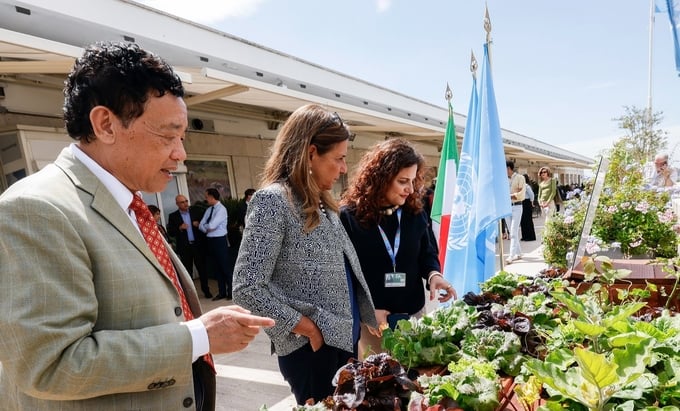June 15, 2025 | 11:41 GMT +7
June 15, 2025 | 11:41 GMT +7
Hotline: 0913.378.918
June 15, 2025 | 11:41 GMT +7
Hotline: 0913.378.918

FAO Director-General QU Dongyu and Rector of La Sapienza University of Rome Antonella Polimeni attending the inauguration of new hydroponic garden at FAO headquarters (Terrace).
The Food and Agriculture Organization of the United Nations (FAO) and La Sapienza University of Rome have further consolidated their research collaboration in the field of sustainable agriculture with the inauguration of a hydroponic garden on the FAO terrace, the result of the study of new water-based growing techniques.
The innovative garden, sponsored by La Sapienza University, the Mountain Partnership Secretariat and the Italian Development Cooperation, introduces innovative techniques that mark a step forward in traditional hydroponics.
The garden, which complements the one installed in 2021 - a result of the already existing partnership between the institutions - allows tap water to be used, eliminating the need for demineralized water and thus reducing the waste of resources. Only organic fertilizers are used in it, reducing the system's ecological footprint - microorganisms dissolved in the water interact with the plants, increasing their resistance to stressors such as high temperatures and pests. In addition, the system is designed for outdoor use, eliminating the need for artificial light used in conventional hydroponics, thus maintaining exceptionally low daily energy consumption. Finally, the garden is built with 90 percent-certified sustainable wood, minimizing the use of plastic used instead in conventional hydroponic systems.
In his keynote address at the ceremony, attended by La Sapienza University Rector Antonella Polimeni and the Deputy Permanent Representative of Italy to FAO Stefania Costanza, the FAO Director-General defined hydroponic agriculture as a combination of traditional and modern technology. He also emphasized the importance of a fruitful and ongoing dialogue between Academia and FAO, which would benefit both parties.
The hydroponic garden will serve as a test bed for research exploring the potential for improved resource management in soilless agriculture that can be an alternative or supplement to conventional agriculture, with potential applications in areas with scarcity of water and arable soil, such as mountains.
During the ceremony, the FAO Director-General and the Rector of La Sapienza University, renewed collaboration on FAO's flagship programme, Globally Important Agricultural Heritage Systems (GIAHS) and the Mountain Partnership, with the hydroponic garden, as set out in the Memorandum of Understanding signed in December 2023.
(FAO)

(VAN) Extensive licensing requirements raise concerns about intellectual property theft.

(VAN) As of Friday, a salmonella outbreak linked to a California egg producer had sickened at least 79 people. Of the infected people, 21 hospitalizations were reported, U.S. health officials said.

(VAN) With the war ongoing, many Ukrainian farmers and rural farming families face limited access to their land due to mines and lack the financial resources to purchase needed agricultural inputs.

(VAN) Vikas Rambal has quietly built a $5 billion business empire in manufacturing, property and solar, and catapulted onto the Rich List.

(VAN) Available cropland now at less than five percent, according to latest geospatial assessment from FAO and UNOSAT.

(VAN) Alt Carbon has raised $12 million in a seed round as it plans to scale its carbon dioxide removal work in the South Asian nation.

(VAN) Attempts to bring down the price of the Japanese staple have had little effect amid a cost-of-living crisis.